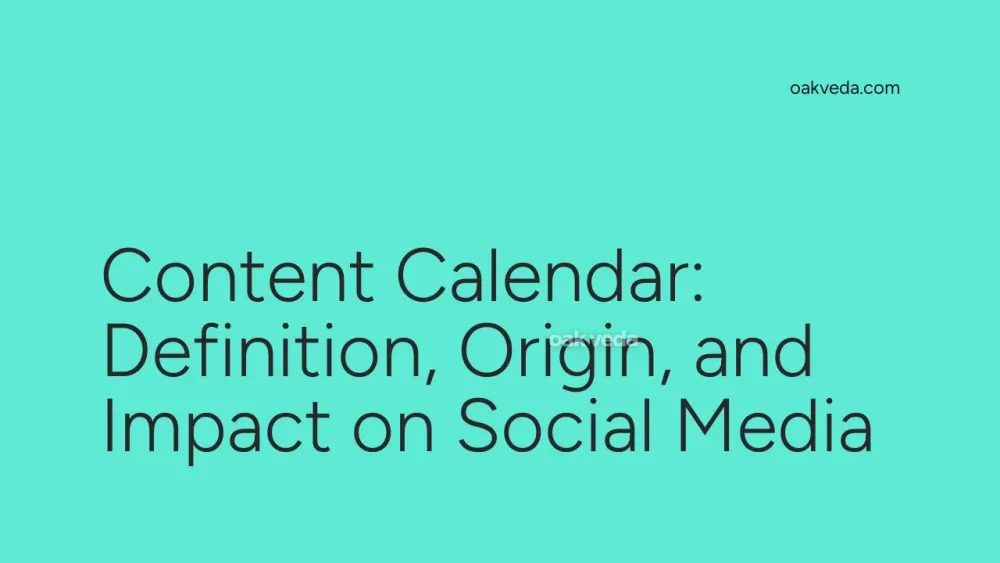
What is a Content Calendar?
A content calendar is a strategic planning tool used by social media marketers, content creators, and businesses to organize, schedule, and manage their content across various digital platforms. It serves as a comprehensive roadmap that outlines when and where specific content pieces will be published, ensuring a consistent and cohesive online presence.
Origin and Development of Content Calendars
The concept of content calendars has evolved alongside the growth of digital marketing and social media. As businesses began to recognize the importance of consistent online communication, the need for a structured approach to content planning became evident. Content calendars emerged as a solution to streamline the process of creating and distributing content across multiple channels.
How Content Calendars Work
Content calendars typically include the following elements:
- Dates and times for content publication
- Content types (e.g., blog posts, social media updates, videos)
- Platform-specific details (e.g., hashtags, captions)
- Content themes or topics
- Assigned team members or responsibilities
By centralizing this information, content calendars enable teams to:
- Maintain a consistent posting schedule
- Align content with marketing goals and campaigns
- Collaborate effectively across departments
- Ensure a balanced mix of content types
- Plan for seasonal events and holidays
Types of Content Calendars
Content calendars come in various forms, depending on the needs and preferences of the user:
- Spreadsheet-based calendars: Often created using tools like Google Sheets or Excel, these offer flexibility and customization.
- Digital calendar tools: Platforms like Google Calendar or Outlook can be adapted for content planning.
- Specialized content calendar software: Tools like Later, Hootsuite, or CoSchedule provide dedicated features for content planning and scheduling.
- Project management platforms: Tools like Trello or Asana can be customized to function as content calendars.
Popular Examples of Content Calendar Usage
Many successful brands and influencers rely on content calendars to maintain their online presence:
- Starbucks: Known for its seasonal campaigns, Starbucks likely uses a content calendar to plan and execute its themed promotions across social media platforms.
- National Geographic: With its diverse range of content across multiple channels, National Geographic undoubtedly employs a robust content calendar to manage its editorial schedule.
- Gary Vaynerchuk: The social media mogul is known for his consistent content output, which is likely supported by a well-structured content calendar.
Impact of Content Calendars on Social Media Culture
Content calendars have significantly influenced social media culture in several ways:
- Increased content consistency: Brands and creators can maintain a steady stream of content, keeping audiences engaged.
- Improved content quality: With more time for planning and creation, the overall quality of content has improved.
- Strategic alignment: Content calendars help align social media efforts with broader marketing goals and campaigns.
- Cross-platform coordination: They enable seamless content distribution across multiple social media platforms.
- Data-driven decision making: By planning content in advance, marketers can analyze performance and adjust strategies accordingly.
How Brands and Influencers Use Content Calendars
Brands and influencers leverage content calendars to:
- Plan themed content: Aligning posts with holidays, events, or product launches.
- Maintain brand voice: Ensuring consistency in messaging across all platforms.
- Optimize posting times: Scheduling content for peak engagement periods.
- Balance content mix: Ensuring a variety of content types to keep audiences engaged.
- Collaborate with team members: Streamlining the content creation and approval process.
Future Trends Related to Content Calendars
As social media continues to evolve, content calendars are adapting to new trends:
- AI-powered content suggestions: Integration of artificial intelligence to recommend content ideas based on audience preferences and trending topics.
- Real-time analytics integration: Immediate performance data to inform on-the-fly content adjustments.
- Cross-platform content adaptation: Tools to automatically adjust content for different social media platforms.
- User-generated content integration: Features to incorporate and schedule user-generated content seamlessly.
- Dynamic content scheduling: AI-driven tools that automatically adjust posting times based on audience activity patterns.
FAQs about Content Calendars
-
How far in advance should I plan my content calendar? Most experts recommend planning at least a month in advance, with some businesses planning quarterly or even annually for major campaigns.
-
Can content calendars be used for personal social media accounts? Absolutely! Content calendars can help individuals maintain a consistent online presence and grow their personal brand.
-
How often should I review and update my content calendar? It's best to review your content calendar weekly, making adjustments based on performance data and current events.
-
What's the difference between a content calendar and an editorial calendar? A content calendar focuses specifically on planning and scheduling content across various platforms, while an editorial calendar typically encompasses broader content strategy and may include additional elements like audience research and content ideation.
-
How can I measure the effectiveness of my content calendar? Track key performance indicators (KPIs) such as engagement rates, reach, and conversions. Compare these metrics before and after implementing a content calendar to gauge its impact.
In conclusion, content calendars have become an indispensable tool in the world of social media marketing. By providing structure, consistency, and strategic alignment, they enable brands and creators to navigate the complex landscape of digital content with greater efficiency and effectiveness. As social media continues to evolve, content calendars will undoubtedly adapt, incorporating new technologies and features to meet the changing needs of marketers and audiences alike.
You may be interested in:
- Unfollow: Definition, Origin, and Impact on Social Media
- Demographics in Social Media: Definition, Origin, and Impact
- B2B in Social Media: Definition, Origin, and Impact
- Situationship: Definition, Origin, and Impact
- Banger: Definition, Origin, and Impact in Social Media
- Moots: Definition, Origin, and Impact on Social Media

